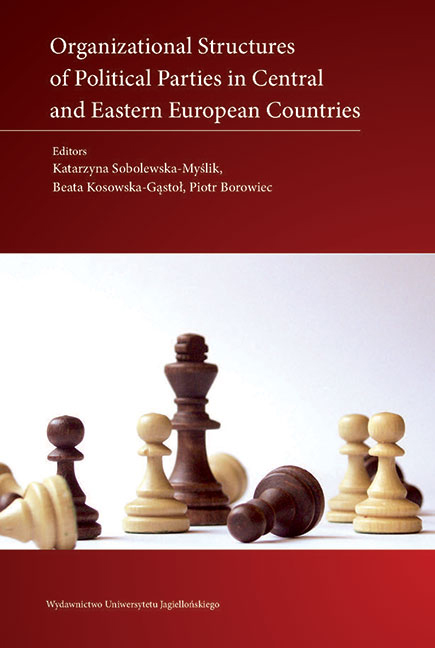Book contents
- Frontmatter
- Contents
- Preface
- Developing Party Structures in Central and Eastern Europe
- Albania: Organizations of Political Parties in Albania
- Belarus: Belarusian Political Parties: Organizational Structures and Practices
- Bosnia and Herzegovina: Organizational Structures of Political Parties in CEE Countries: A Case Study on Bosnia and Herzegovina
- Bulgaria: Organizational Structure and Trends in Bulgarian Party Politics
- Croatia: Organizational Structures of Political Parties in Croatia
- Czech Republic: Between Organizational Extremes: Czech Parties after a Political Earthquake
- Estonia: Organizational Structures of Political Parties in Estonia
- Hungary: Cut from the Same Cloth? A Comparative Analysis of Party Organizations in Hungary
- Kosovo: Structure of the Main Political Parties in Kosovo
- Latvia: Leader-Centered and Power-Hungry: Party Organizations in Latvia
- Lithuania: Organization of Political Parties: The Case of Lithuania
- Moldova: Organizational Structures of Political Parties in The Republic of Moldova
- Montenegro: Party Organization in Montenegro: Structural Resemblance Behind Political Divergence
- Poland: Structures of Polish Political Parties in the Second Decade of the 21st Century
- Romania: The Internal Organization of Romanian Political Parties
- Russia: Parties with Roots Growing Upwards: Organizational Features of Russian Political Parties
- Serbia: Organizational Structures of Political Parties in Serbia
- Slovakia: Organizational Structures of Political Parties in Slovakia: Parties not for Members
- Slovenia: Almost without Any Innovations: Organizational Structures in Slovenian Parties
- Ukraine: Shallow Party Structures in a Volatile Party System
- Comparing Organizational Structures of Political Parties in Central and Eastern European Countries
- Biographical notes about the authors
Kosovo: Structure of the Main Political Parties in Kosovo
- Frontmatter
- Contents
- Preface
- Developing Party Structures in Central and Eastern Europe
- Albania: Organizations of Political Parties in Albania
- Belarus: Belarusian Political Parties: Organizational Structures and Practices
- Bosnia and Herzegovina: Organizational Structures of Political Parties in CEE Countries: A Case Study on Bosnia and Herzegovina
- Bulgaria: Organizational Structure and Trends in Bulgarian Party Politics
- Croatia: Organizational Structures of Political Parties in Croatia
- Czech Republic: Between Organizational Extremes: Czech Parties after a Political Earthquake
- Estonia: Organizational Structures of Political Parties in Estonia
- Hungary: Cut from the Same Cloth? A Comparative Analysis of Party Organizations in Hungary
- Kosovo: Structure of the Main Political Parties in Kosovo
- Latvia: Leader-Centered and Power-Hungry: Party Organizations in Latvia
- Lithuania: Organization of Political Parties: The Case of Lithuania
- Moldova: Organizational Structures of Political Parties in The Republic of Moldova
- Montenegro: Party Organization in Montenegro: Structural Resemblance Behind Political Divergence
- Poland: Structures of Polish Political Parties in the Second Decade of the 21st Century
- Romania: The Internal Organization of Romanian Political Parties
- Russia: Parties with Roots Growing Upwards: Organizational Features of Russian Political Parties
- Serbia: Organizational Structures of Political Parties in Serbia
- Slovakia: Organizational Structures of Political Parties in Slovakia: Parties not for Members
- Slovenia: Almost without Any Innovations: Organizational Structures in Slovenian Parties
- Ukraine: Shallow Party Structures in a Volatile Party System
- Comparing Organizational Structures of Political Parties in Central and Eastern European Countries
- Biographical notes about the authors
Summary
Introduction
Using a single model or theoretical frame of party organization is not feasible when analyzing Central and Eastern European political parties. The differences between them are simply too great. This chapter will present an analysis of the political landscape in Kosovo, the youngest of all post-Yugoslav states. We will discuss the Kosovan political framework by analyzing three main political parties: PDK, LDK, and VV. Firstly, we will briefly present key national legal regulations on the creation and functioning of Kosovan parties. Secondly, we will continue by highlighting the major characteristics shared by all the main parties in Kosovo today, such as relatively low internal party democracy, and issues of transparent party financing. Thirdly, we will introduce a brief overview of the structure, rules, and functioning of the three political parties. Finally, we will end with a vertical presentation of the organizational scheme of the two biggest parties, PDK and LDK.
To begin with, it should be understood that Kosovan political parties are in fact very young, and that they oft en lack ideological orientation, clear programs, and are vague regarding their membership figures (KIPRED 2012: 11). Nevertheless, they satisfy the basic criteria for classification as political parties, and are in the process of transformation as part of Kosovo's transition to democracy. Unfortunately, Kosovan parties are still very much ethnically divided, which reflects the divisions that still exist in the country today (Nenadović 2012: 98). The youngest European state, Kosovo has had its share of transitional troubles, mainly in terms of corruption, organized crime, poor rule of law, and underdeveloped economy (Kosovo Progress Report 2014).Thus, local political parties are oft en seen as very convenient tools for attaining positions of power, which in turn provide their holders with social advantages that the majority of Kosovan citizens lack.
The three political parties that are the focus of this chapter will be considered in terms of election results, popular support, and political activity in recent years.
- Type
- Chapter
- Information
- Organizational Structures of Political Parties in Central and Eastern European Countries , pp. 209 - 230Publisher: Jagiellonian University PressPrint publication year: 2017



